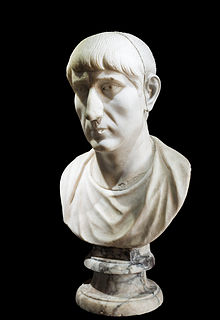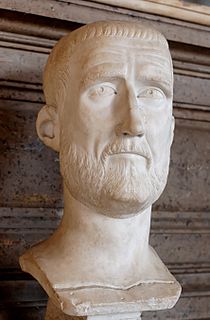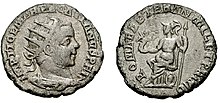
The Bastarnae and Peucini were two ancient peoples who between 200 BC and 300 AD inhabited areas north of the Roman frontier on the Lower Danube. The Bastarnae lived in the region between the Carpathian Mountains and the river Dnieper, to the north and east of ancient Dacia. The Peucini occupied the region north of the Danube Delta.

Flavius Julius Constantius, known as Constantius II, was Roman emperor from 337 to 361. His reign saw constant warfare on the borders against the Sasanian Empire and Germanic peoples, while internally the Roman Empire went through repeated civil wars, court intrigues and usurpations. His religious policies inflamed domestic conflicts that would continue after his death.

Flavius Honorius was Roman emperor from 393 to 423. He was the younger son of emperor Theodosius I and his first wife Aelia Flaccilla, and brother of Arcadius, who ruled the eastern half of the empire from 395, when their father died, until his death in 408. In 410, during Honorius's reign over the western Roman Empire, Rome was sacked for the first time in almost 800 years.
The 410s decade ran from January 1, 410, to December 31, 419.

Marcus Aurelius Probus was Roman emperor from 276 to 282. Probus was an active and successful general as well as a conscientious administrator, and in his reign of six years he secured prosperity for the inner provinces while withstanding repeated invasions of barbarian tribes on almost every sector of the frontier.

Gaius Messius Quintus Traianus Decius, sometimes translated as Trajan Decius, was Roman emperor from 249 to 251.

Philip the Arab was Roman emperor from 244 to 249. He was born in Aurantis, Arabia, in a city situated in modern-day Syria. After the death of Gordian III in February 244, Philip, who had been Praetorian prefect, achieved power. He quickly negotiated peace with the Persian Sassanid Empire and returned to Rome to be confirmed by the senate. During his reign, the city of Rome celebrated its millennium.

Marcus Aemilius Aemilianus, also known as Aemilian, was Roman emperor for three months in 253.

Domitian II was probably a Roman soldier of the mid 3rd century who was acclaimed emperor, probably in northern Gaul in late 270 or early 271, and struck coins to advertise his elevation. It is now generally assumed that this man is to be equated with the Domitianus who is twice mentioned in the literary sources as a significant figure in the politics of the age, but on neither occasion as an outright contender for the Imperial throne.

Uranius is the name of two possible Roman usurpers of the third century.

The end of Roman rule in Britain was the transition from Roman Britain to post-Roman Britain. Roman rule ended in different parts of Britain at different times, and under different circumstances.

The Carpi or Carpiani were an ancient people that resided in the eastern parts of modern Romania in the historical region of Moldavia from no later than c. AD 140 and until at least AD 318.
Gainas was a Gothic leader who served the Eastern Roman Empire as magister militum during the reigns of Theodosius I and Arcadius.

Marcus F. Ru. Jotapianus or Jotapian, also known as Iotapianus or Iotapian, was a usurper in the eastern provinces of the Roman Empire during the reign of Emperor Philip the Arab, around 249. Jotapianus is known from his rare coins and from accounts in Aurelius Victor, Zosimus, and Polemius Silvius (Laterculus).
Odotheus was a Greuthungi king who in 386 led an incursion into the Roman Empire. He was defeated and killed by the Roman general Promotus. His surviving people settled in Phrygia.
Marcellus was an officer of the Roman Empire, supporter of usurper Procopius and usurper himself for a short time.
Sarus or Saurus was a Gothic chieftain and commander for the emperor Honorius. He was known for his hostility to the prominent Gothic brothers-in-law Alaric I and Athaulf, and was the brother of Sigeric, who ruled the Goths briefly in 415.

Athanaric or Atanaric was king of several branches of the Thervingian Goths for at least two decades in the 4th century. Throughout his reign, Athanaric was faced with invasions by the Roman Empire, the Huns and a civil war with Christian rebels. He is considered the first king of the Visigoths, who later settled in Iberia, where they founded the Visigothic Kingdom.
The Battle of Verona was fought between the Roman general and usurper Decius, and Roman Emperor Philip the Arab in 249. Decius was victorious, and Philip was killed. Decius then became Roman Emperor.
This page is based on this
Wikipedia article Text is available under the
CC BY-SA 4.0 license; additional terms may apply.
Images, videos and audio are available under their respective licenses.













